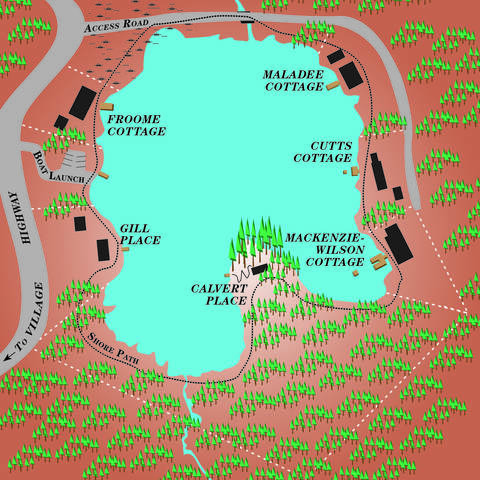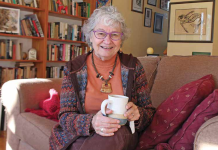Editor’s note: This is the first installment of a series entitled Harp on the Water. It’s written by Hope Thompson, who lives in Algonquin Highlands. Thompson writes for theatre and television and has had plays produced in Toronto, Vancouver and Los Angeles. She recently wrote for the CBC’s Baroness von Sketch Show and is currently working on a collection of crime stories. Her series will run over the next eight weeks.
Spruce County Police Detective, Harry Harp, panted up the crisscrossing path that led from the dock to the top of the point. He was tall with dark eyes and at 47, had a creased forehead, giving him a quizzical look. Three weeks earlier, he had relocated to Spruce County, grateful for the escape from Toronto and the bitter aftermath of his failed marriage. For his first case in Spruce County, Harp had chosen a business suit but could already feel his dress shirt clinging, damply, to his skin.
Mistake number one, he thought.
Trotting behind Harp was Constable Terry Becker. A tanned local, he looked enviably comfortable in his cargo pants and shortsleeved cop-issue shirt.
Nimbly leading the trio up the path was Frank Gill. He looked to be in his 70s and was wearing work pants held up by suspenders over a checked shirt. About forty minutes earlier, Gill had called the police station in town and told the desk clerk that there was trouble at the Calvert place. He had met Harp and Becker at the boat launch to ferry them across the lake. During the boat ride, Gill explained that the Calverts lived off-grid. They also didn’t have a phone. Gill’s place was across the lake from the point and he’d woken to the sound of screaming.
The path from the dock ended in front of a wood-sided cottage. Two rotting chairs stood in front of it and Harp noticed that they were turned away from the lake, as if purposely ignoring the view.
That’s odd, Harp thought, catching his breath.
But there wasn’t much to see, anyway. A wall of trees blocked out the view of the lake, and, he guessed, hid the point’s inhabitants from prying eyes below.
Frank Gill stepped forward and knocked on the front door of the cottage, then without waiting for a response, pushed open the door. Harp and Becker followed him into a narrow room. The detective adjusted his eyes to its dim interior, lit by a single wick lantern and smelling strongly of dust and kerosene. The main feature of the room was a long display shelf of natural objects—a turtle’s shell, birds’ nests, a pair of deer antlers, varieties of dried leaves, desiccated berries, a piece of shelf fungus, the abandoned skin of a snake. At the far end was a small kitchen with a woodstove, cupboards and a length of counter. Across from the room’s only window was a pair of threadbare chairs and a sagging sofa. Sitting on the sofa was a woman and her eyes were fixed on Harp.
Frank Gill closed the door behind Harp and Becker. “Grace,” he said gently. “These men are police. They come to help—about Ida.” The woman wiped her eyes with a piece of cloth she pulled from her shirt pocket. It was then that Harp noticed something in her hair.
Pine needles?
She was wearing faded cotton pants smudged on the knees like she’d been kneeling in dirt and her flannel men’s shirt was caught with burrs.
“Ms. Calvert, I’m Detective Harp and—.” Cutting him off, she said, “My dead mother is in her bedroom.” She gestured to a narrow hallway then added. “They finally got what they wanted.”
Harp said, “They?”
“The cottagers!” She cried. “They hate us—.” Her face crumpled into tears.
Frank Gill stayed with Grace while Harp and Becker walked down the hallway to a closed door. Gently pushing it open, they were met with the smell of floral perfume, mothballs and blood. Ida Calvert lay on her bed under a flowered eiderdown, her grey-hair fanned out over her blood-soaked pillow. Liver-spotted hands were folded over her chest. Serene, almost, except that something had struck the woman’s face with enough force that her features—eyes, nose and mouth—were gone. Bits of bone mixed with wood chips and dirt lay scattered around.
“Becker?” Harp said.
The constable looked up and Harp noticed he’d lost some of his tan.
“Walk around the place, check the doors, windows, make note of anything out of order.”
The young man nodded.
A moment later, Harp was alone with the faceless woman.
To the right of the bed stood a chest of drawers and on it, was a collection of combs and lotions. The curved vials and tubes looked like they’d been sitting there for decades, grease darkened with dust and time. His gaze followed back over the woman’s thin body to the left of the bed where a side table had been placed. A glass of water stood next to a flashlight. Harp positioned himself between the wall, the side table, and the woman’s bed then raised his hands over his head and swiftly brought them down towards the woman’s missing face.
He frowned, thinking.
The room had one small window. Taking a step towards it Harp banged his knee against the sharp corner of the steel bed frame. Cursing, he gripped his kneecap and hobbled to the window. From the flakes of varnish in the corner of the frame, it was clear that it hadn’t been opened in years.
Harp looked back at Ida Calvert, his brain turning over.
After his inspection, Harp returned to the cabin’s main room. Grace Calvert stood at the counter ladling water from a bucket into an aluminum coffee pot.
“All we ever wanted was nature and quiet,” she said and pushed her hair back from her face. Her features were smooth, even patrician and Harp felt himself strangely drawn to her.
“I just never imagined they’d go this far.” She placed the pot on the woodstove.
“You say the other cottagers—hate you?”
A mosquito buzzed around his head.
“Because we’re different. We’re not like them. We don’t race around in boats screaming our heads off and blowing up firecrackers—.” She squished shut her eyes. When she opened them, anger had replaced her tears. “That’s why they hate us. That’s why they killed my mother!”
Harp tried to loosen his tie then thought better of it. “For the record, where were you last night, Ms. Calvert?”
At that moment, Harp noticed movement from the corner of his eye and turned his head. A scene unfolded through the front window as if a movie director had yelled, “Action!”
From the east side of the point, Becker ran into view waving dirt-covered hands. From the west, Spruce County Coroner, Boyce Williams, followed by two assistants, paraded up the path. And at centre stage, Frank Gill sat on a swing hung between two pine trees. The old man was swinging back and forth like a child.
Harp blinked.
Behind him, Grace Calvert was speaking. “I was in the forest, Detective. Sleeping. I walked to the village to buy a newspaper and when I returned, my boat was gone. They do that to us.”
“Wait—the forest?” Harp turned to her. Grace sighed. “With no boat, I had to walk around the lake. It became dark—so I lay down. I feel quite safe in the woods. At least you can trust the animals.”
Just then, the door burst open.
- To be continued





